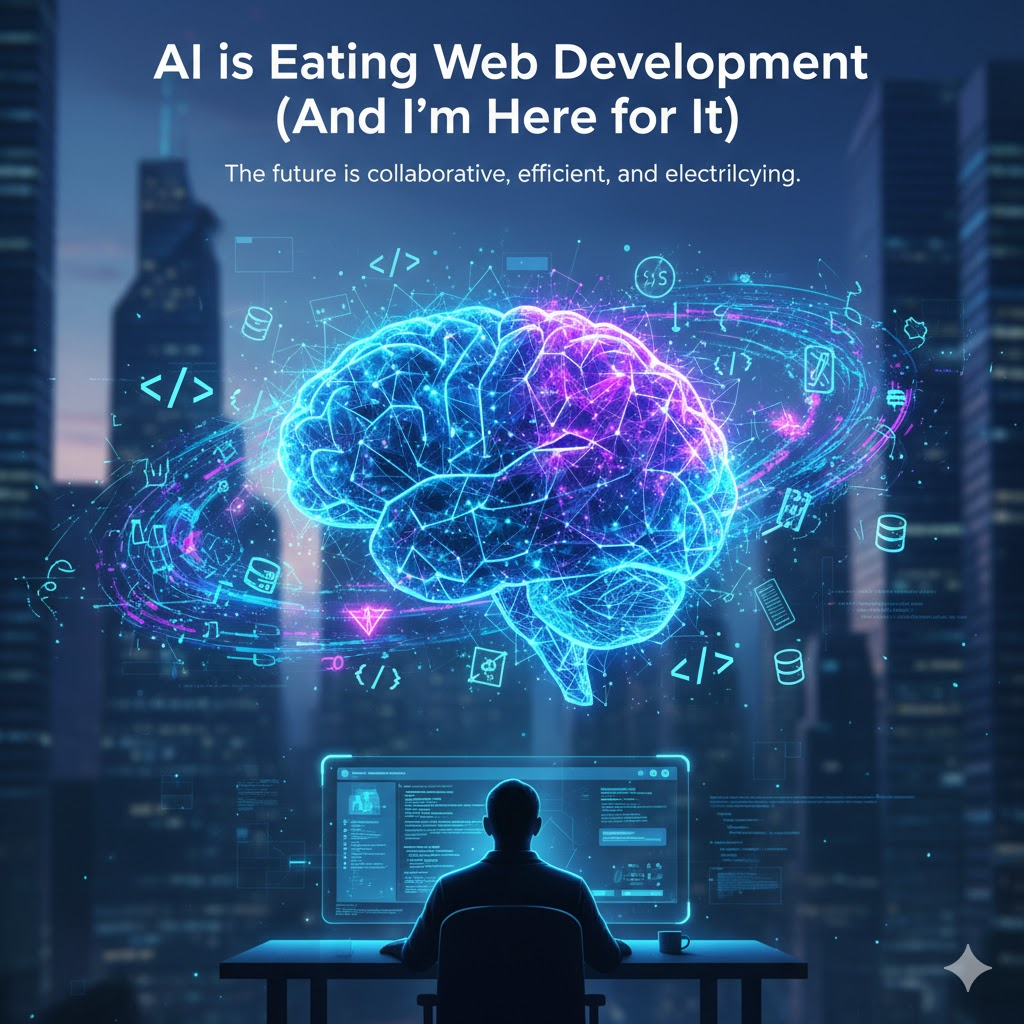AI is Eating Web Development (And I'm Here for It)
Remember when we thought AI would just autocomplete our code? Well, it's 2025, and AI isn't just suggesting the next line anymore. It's building entire features, refactoring legacy code, and honestly, doing things I didn't think possible a year ago.
The Reality Check
Let me be real with you. When GitHub Copilot first came out, I was skeptical. "It's just fancy autocomplete," I thought. Then GPT-4 dropped. Then Claude got better. Then Cursor, Windsurf, and a dozen other AI coding assistants showed up. Now? I literally can't imagine coding without them.
But here's the thing everyone's afraid to say out loud: AI hasn't replaced developers. It's just made us ridiculously more productive.
What's Actually Changed
The shift isn't subtle anymore. AI tools can now understand entire codebases, explain complex logic, and suggest architectural improvements. They're like having a senior developer pair programming with you 24/7, except they never get tired or judgmental about your variable names.
I've watched AI generate a complete authentication system in minutes. Not just the boilerplate, but proper error handling, security considerations, and even tests. Would I ship that code as-is? No. But did it save me hours of repetitive work? Absolutely.
The Tools That Matter
Right now, the game-changers are Cursor and GitHub Copilot Workspace. Cursor lets you chat with your entire codebase, and it actually understands context. Ask it "why is this component re-rendering?" and it'll trace through your code and tell you exactly why.
// AI doesn't just write code, it understands patterns const optimizedComponent = React.memo(({ data }) => { // AI suggested useMemo here after analyzing re-render patterns const processedData = useMemo(() => expensiveOperation(data), [data] ); return <Display data={processedData} />; });
GitHub Copilot Workspace takes it further. You describe a feature in plain English, and it generates a plan, writes the code across multiple files, and creates tests. It's wild.
The Part Nobody Talks About
AI makes junior developers dangerous in the best way. Someone with 6 months of experience can now ship features that would've taken years to learn. They're asking AI to explain patterns, generating boilerplate, and moving fast.
But there's a flip side. If you don't understand what AI is generating, you're building a house on sand. I've seen it happen. Beautiful code that looks perfect but has subtle bugs because the developer didn't verify the logic.
What AI Can't Do (Yet)
AI struggles with product decisions. It can't tell you what feature to build or how users will actually interact with your app. It won't know that your startup needs to ship fast and iterate, not build the perfect architecture.
It also can't debug that weird production issue that only happens on Thursdays at 3 PM for users in Australia. Context matters, and AI doesn't have all of it.
The New Developer Workflow
Here's how I work now, and honestly, I'm never going back:
Start with a problem. Describe it to AI. Get a solution. Review it carefully. Understand every line. Modify what doesn't fit. Ship it. This isn't lazy coding. It's smart coding.
// Modern workflow: describe intent, AI handles implementation interface UserProfile { id: string; preferences: UserPreferences; activity: ActivityLog[]; } // AI generated this entire type-safe data layer // I reviewed it, tweaked the cache strategy, and shipped it async function getUserProfile(userId: string): Promise<UserProfile> { // Implementation details AI got right: // - Proper error handling // - Type safety throughout // - Caching strategy // - Edge case handling }
Where This is Going
The trend is clear. AI will get better at writing code. Much better. But the need for developers who understand systems, architecture, and user needs? That's not going anywhere.
We're moving from "writing code" to "directing code generation." And honestly? That's more interesting. I'd rather spend time solving problems than typing boilerplate.
The Honest Truth
If you're learning to code in 2025 and not using AI, you're working with one hand tied behind your back. But if you're using AI without understanding what it's doing, you're going to hit a wall hard.
The sweet spot is using AI as a force multiplier. Let it handle the repetitive stuff. Let it suggest solutions you hadn't considered. But always, always understand what you're shipping.
What I'm Excited About
The next wave is AI agents that can handle entire tickets from start to finish. Not just writing code, but understanding requirements, asking clarifying questions, and iterating based on feedback.
Imagine describing a feature Friday afternoon and coming back Monday to a PR that's ready for review. That's not science fiction anymore. That's 2025.
Final Thoughts
AI hasn't made developers obsolete. It's made us superhuman. We can build in weeks what used to take months. We can experiment faster, learn quicker, and ship better products.
The developers who win in this new world are the ones who embrace AI while staying grounded in fundamentals. Know your tools. Understand your code. Ship great products.
Because at the end of the day, AI is just a tool. A really, really good tool. But still a tool. And the best developers have always known how to use their tools well.
What's your experience with AI in development? Are you all-in, or still skeptical? I'd love to hear your thoughts.
Enjoyed this post?
Check out more articles on my blog
